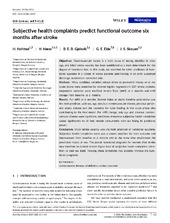| dc.contributor.author | Hofstad, Håkon | en_US |
| dc.contributor.author | Næss, Halvor | en_US |
| dc.contributor.author | Gjelsvik, Bente E Bassøe | en_US |
| dc.contributor.author | Eide, Geir Egil | en_US |
| dc.contributor.author | Skouen, Jan Sture | en_US |
| dc.date.accessioned | 2017-04-18T12:24:00Z | |
| dc.date.available | 2017-04-18T12:24:00Z | |
| dc.date.issued | 2017-02 | |
| dc.Published | Acta Neurologica Scandinavica 2017, 135:161-169 | eng |
| dc.identifier.issn | 0001-6314 | |
| dc.identifier.uri | https://hdl.handle.net/1956/15699 | |
| dc.description.abstract | Objectives: Cerebrovascular stroke is a main cause of lasting disability in older age, and initial stroke severity has been established as a main determinant for the degree of functional loss. In this study, we searched for other predictors of functional outcome in a cohort of stroke patients participating in an early supported discharge randomised controlled trial. Methods: Thirty candidate variables related either to premorbid history or to the acute stroke were examined by ordered logistic regression in 229 stroke patients. Dependent variables were modified Rankin Scale (mRS) at 6 months and mRS change from baseline to 6 months. Results: For mRS at 6 months, Barthel Index at stable baseline post-stroke was the main predictor, with sex, age, previous cerebrovascular disease, previous peripheral artery disease and the necessity for tube feeding in the acute phase also contributing to the final model. For mRS change, only age and previous cerebrovascular disease were significant predictors. Prestroke subjective health complaints added significantly to all final models concurrently with sex losing its predictive power. Conclusions: Initial stroke severity was the main predictor of functional outcome. Subjective health complaints score was a potent predictor for both outcome and improvement from baseline to 6 months and at the same time ameliorated the predictive impact of sex. The poorer functional prognosis for women after stroke may therefore be related to their higher load of subjective health complaints rather than to their sex itself. Treating these complaints may possibly improve the functional prognosis. | en_US |
| dc.language.iso | eng | eng |
| dc.publisher | Wiley | eng |
| dc.rights | Attribution CC BY-NC | eng |
| dc.rights.uri | http://creativecommons.org/licenses/by-nc/4.0/ | eng |
| dc.subject | cerebrovascular diseases | eng |
| dc.subject | Rehabilitation | eng |
| dc.subject | strokes | eng |
| dc.subject | Treatment | eng |
| dc.title | Subjective health complaints predict functional outcome six months after stroke | en_US |
| dc.type | Peer reviewed | |
| dc.type | Journal article | |
| dc.date.updated | 2016-12-15T15:18:26Z | |
| dc.description.version | publishedVersion | en_US |
| dc.rights.holder | Copyright 2016 The Author(s) | |
| dc.identifier.doi | https://doi.org/10.1111/ane.12624 | |
| dc.identifier.cristin | 1410220 | |

